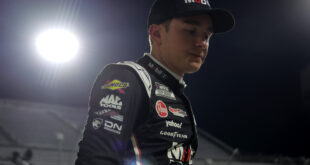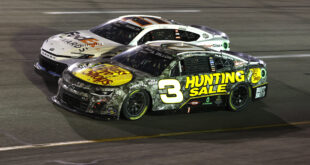All week long, since Monday afternoon when one maneuver landed one driver on the naughty list for the following weekend, the discussion was if the sanctioning body would allow the same driver to still have the chance to battle for a championship.
Sure enough, that decision was made, and based on past events, was assuredly going to become a reality.
And that has been the debate ever since…to waive, or not to waive. Apparently Shakespeare did not realize that his classic Hamlet line would be involved in stock car racing, even when paraphrased. However, this does create a debate on whether it’s deserving, or not deserving. So what exactly is the issue here of having Chase Elliott, who already had a medical waiver after missing six races with a broken leg, get another one because of being suspended for the weekend?
The talk of a waiver really was never a discussion until years earlier, when Tony Stewart got injured prior to the season and missed the first several events. We’ve seen Stewart use it, Kyle Busch in 2015 after he broke both legs at Daytona, brother Kurt had one last year for his concussion as well. Kurt and team withdrew their waiver since he would not return to the car, and allowed another driver to compete for the title.
Dale Earnhardt Jr. went through the same in 2016, and received a waiver, but never got back in the car.
All these incidents, including the one for Elliott, all happened due to injuries received in racing. At the same time, we know a medical waiver possibly would be given for a medical reason outside of racing. Years ago, after Jeff Gordon and wife, Ingrid, were expecting their little girl, Ella, he would have potentially missed racing at Sonoma due to Ingrid being so close to giving birth. Would NASCAR have given him a waiver if he missed the race…most likely, yes.
Where the question comes is does a waiver still apply when the sanctioning body decides to park a driver for a weekend?
This could be a debate that began all the way back in 2002.
During the first Martinsville weekend, Kevin Harvick intentionally spun a competitor during the truck race. Admitting it on the radio to the team, officials heard that and told him his day was done. His weekend, surely wasn’t…until NASCAR decided the move was enough to send him home for the Cup race, as Kenny Wallace made the start in his place.
Should he have been given a waiver for an on-track incident?
Then there’s Kyle Busch, again, just over a decade ago when he was doing the triple-header at Texas. One run-in during the truck race made him go berserk on Ron Hornaday, turning him into the wall under yellow, and NASCAR literally had no option but to park him for the race. One day later, Busch met with officials, and the decision was made that he was not racing in Xfinity nor Cup either.
Had it not been so late in the season, would Busch have been given a waiver if requested?
And now, there’s Chase vs. Denny Hamlin. Exactly what is the right call for this moment? Already with a medical waiver because of injury from a non-racing incident, is it automatically just a right of passage that he be given a second one for intentionally turning a competitor?
We never heard about this kind of discussion when it came to on-track rivalries like Dale Earnhardt vs. Darrell Waltrip, or Kurt Busch against Jimmy Spencer. The first never resulted in a suspension, but we all remember “Mr. Excitement” getting parked for the Bristol weekend after getting into a fight after Michigan with Busch, and then Busch winning at Bristol while Spencer spent it watching from home.
So, why is this a a big deal?
It’s simple, it’s time that NASCAR takes another look at it’s waiver requirements, to see if there’s room for change. Even at the local level, when there’s an incident on the track where it’s intentional and the track owners see it that way, drivers are often barred from racing there for the remainder of the year. In essence, the hopes of winning a title are dashed then and there.
With NASCAR, even though there was a precedent set with Johnny Sauter, this is an issue that needs to be discussed.
A waiver for a non-medical reason, specifically on-track actions, may need a bit of improvement. Not saying make the driver jump through hoops to remain championship eligible, but make it more of an incentive to not let road rage cost a bigger picture.
The unwritten rule in all circle track racing, no matter the type of car, is hooking a driver in the right rear corner on purpose is unacceptable. It happens accidentally, we’ve seen it, as drivers will get loose, try to correct, and catch another by mistake. But, doing so with the intent to end the day for another driver, that is when it is foul. It’s like intentionally hitting the driver’s door in a demolition derby, the same rule applies.
So, where does NASCAR go from here?
They already have set the precedent for this season, so changing policy now is not going to work, especially with over half the regular season remaining until playoffs. What may happen is having this looked at heading into 2024.
What they decide is not of anyone’s choosing except the sanctioning body. When it comes to a suspension, that is what needs looked at, because granting a championship opportunity after being told a driver isn’t racing for a weekend, or more, sets a bad example.
This is the talk of the garage, the shops, and the media center until the next big moment occurs. To waive, or not to waive. To suspend, or not to suspend. To let the “boys have at it,” or to let officials say when enough is enough.
These all are, indeed, the questions.
 All About Horse Power Motorsports 24/7
All About Horse Power Motorsports 24/7



